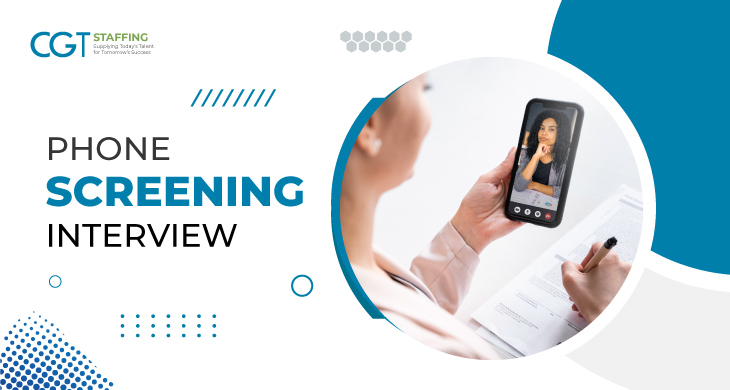Phone screening interviews have become an integral part of the hiring process for many companies. These initial conversations serve as a way to assess candidates’ qualifications and skills before moving on to in-person interviews. While a phone screening interview may seem straightforward and less formal than face-to-face meetings, there are important aspects that candidates often overlook. This blog examines aspects of phone screen interviews about which you may not be aware, helping you better prepare and increase your chances of getting hired.
Table of Contents
First Impressions Matter
Although phone screenings don’t involve visual cues, first impressions are still crucial. Your tone of voice, articulation, and enthusiasm can make a significant impact. An essential phone screening interview tip: start the conversation with a confident and professional greeting, and maintain a positive and engaging attitude throughout the call. Remember that the interviewer forms an opinion about you from the moment you pick up the phone.
Go Prepared
Treat a phone screening interview with the same seriousness as an in-person interview. Research the company, familiarize yourself with the job description, and prepare answers to common phone screening interview questions. Additionally, have a copy of your resume, the job description, and any notes you’ve made readily available during the call. Being well-prepared will allow you to respond confidently and showcase your knowledge.
Minimize Distractions
A professional environment will help you stay focused and make a positive impression on the interviewer. For that reason, it is essential that you find a quiet and comfortable space for the interview where you can focus solely on the conversation. Inform those around you about the interview and request their cooperation in minimizing any potential interruptions. Turn off notifications on your phone, close unnecessary tabs on your computer, and ensure that you have a reliable phone signal or a stable internet connection if using VoIP.
Use Notes Strategically
One significant advantage of a phone screening interview is the ability to have notes in front of you. However, it’s essential to use them strategically. Jot down key points, bullet lists, or reminders to stay on track. Avoid reading directly from your notes, as it may come across as disengaged or unprepared. The interviewer wants to assess your knowledge and communication skills, so use your notes as a reference, not as a script.
Active Listening
You cannot rely on visual cues during a phone interview. For that reason, active listening becomes even more critical. Pay close attention to what the interviewer is saying, take brief pauses before responding, and show your engagement by paraphrasing or summarizing their questions or comments.
Because the interviewer is not able to gauge the interviewee’s attention skills face-to-face, active listening skills will be key to properly comprehending and understanding all prompts. This further demonstrates your ability to comprehend and respond thoughtfully.
Be Conscious of Your Speaking Pace
Through your demonstration of clear communication skills, you show that you can effectively collaborate and convey information, even without visual cues, both during the interview and in your pre and post-interview communication with the interviewer or any other talent acquisition specialist.
Nervousness can sometimes lead to speaking too quickly or rambling on. It is important to maintain a moderate pace and give the interviewer enough time to process your responses. Take a breath before answering each question and speak in a clear and concise manner. Quality always trumps quantity in phone interviews.
Leverage Non-Verbal Communication
While the interviewer can’t see you, your non-verbal cues still have an impact. Smile when appropriate, as it can influence your tone and convey positivity. Maintain an upright posture and avoid slouching or fidgeting, as it affects your voice projection and confidence level. Even though these non-verbal cues aren’t visible, they contribute to your overall presence during the interview.
Ask Thoughtful Questions
Towards the end of the interview, the interviewer will usually ask if you have any questions. Prepare a few insightful questions in advance to show your interest and engagement. Ask about the company culture, the team dynamics, or any specific challenges related to the role. These questions not only demonstrate your genuine curiosity but also help you evaluate if the position aligns with your goals.
Be Prepared for Technical Difficulties
Technical difficulties can occur during phone screenings, such as poor reception, dropped calls, or audio issues. It’s important to remain calm and professional if these issues arise. Keep your Pittsburgh staffing agency and the interviewer informed as problems arise. Additionally, offer alternative solutions, such as switching to another phone or rescheduling the interview. Handling technical difficulties with grace and problem-solving skills can leave a positive impression.
Follow Up with a ‘Thank You’ Note
Just as after an in-person interview, it is essential to send a thank you note or email to the interviewer after a phone screening. Express your appreciation for their time, reiterate your interest in the position, and highlight any key points you discussed. This simple gesture can leave a positive impression and remind the interviewer of your candidacy.
Conclusion
Phone screening interviews provide an opportunity to make a strong initial impression and progress to the next stage of the recruitment life cycle. By being aware of these often-overlooked aspects, you can optimize your performance and increase your chances of success. Remember to present yourself professionally, prepare thoroughly, and leverage the advantages that a phone interview offers.
Frequently Asked Questions
What is a phone screening interview?
Ans: A phone screening interview is a preliminary conversation between a job candidate and a recruiter or hiring manager to assess basic qualifications and determine suitability for further evaluation.
How to do a phone screening interview?
Ans: During a phone screening interview, ask targeted questions to assess a candidate’s qualifications and determine their suitability for further consideration.
How to pass a phone screening interview?
Ans: Prepare and practice concise and confident responses to common interview questions. Research the company, practice common interview questions, and highlight your relevant skills and experiences.
